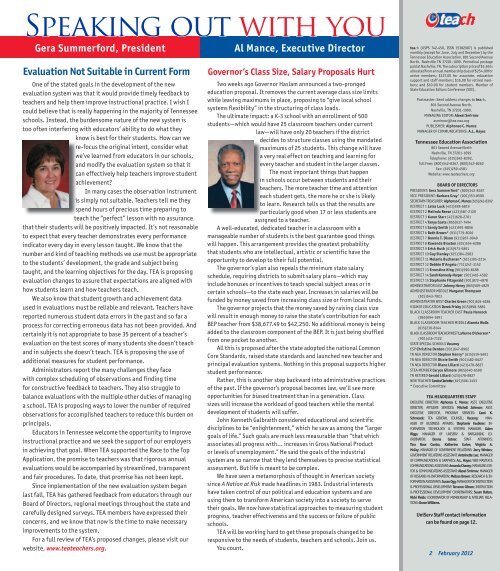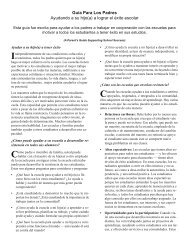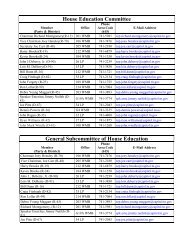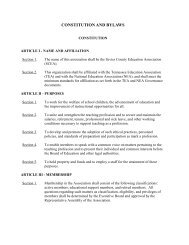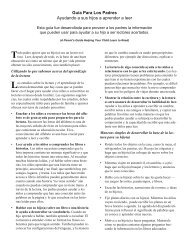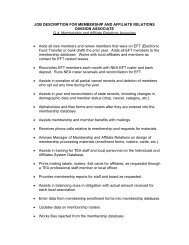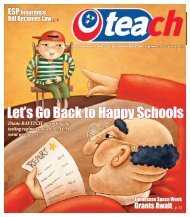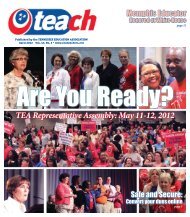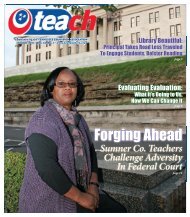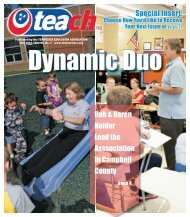February - Tennessee Education Association
February - Tennessee Education Association
February - Tennessee Education Association
You also want an ePaper? Increase the reach of your titles
YUMPU automatically turns print PDFs into web optimized ePapers that Google loves.
Speaking out with you<br />
Gera Summerford, President<br />
Evaluation Not Suitable in Current Form<br />
One of the stated goals in the development of the new<br />
evaluation system was that it would provide timely feedback to<br />
teachers and help them improve instructional practice. I wish I<br />
could believe that is really happening in the majority of <strong>Tennessee</strong><br />
schools. Instead, the burdensome nature of the new system is<br />
too often interfering with educators’ ability to do what they<br />
know is best for their students. How can we<br />
re-focus the the original intent, consider what<br />
we’ve learned from educators in our schools,<br />
and modify the evaluation system so that it<br />
can effectively help teachers improve student<br />
achievement?<br />
In many cases the observation instrument<br />
is simply not suitable. Teachers tell me they<br />
spend hours of precious time preparing to<br />
teach the “perfect” lesson with no assurance<br />
that their students will be positively impacted. It’s not reasonable<br />
to expect that every teacher demonstrates every performance<br />
indicator every day in every lesson taught. We know that the<br />
number and kind of teaching methods we use must be appropriate<br />
to the students’ development, the grade and subject being<br />
taught, and the learning objectives for the day. TEA is proposing<br />
evaluation changes to assure that expectations are aligned with<br />
how students learn and how teachers teach.<br />
We also know that student growth and achievement data<br />
used in evaluations must be reliable and relevant. Teachers have<br />
reported numerous student data errors in the past and so far a<br />
process for correcting erroneous data has not been provided. And<br />
certainly it is not appropriate to base 35 percent of a teacher’s<br />
evaluation on the test scores of many students she doesn’t teach<br />
and in subjects she doesn’t teach. TEA is proposing the use of<br />
additional measures for student performance.<br />
Administrators report the many challenges they face<br />
with complex scheduling of observations and finding time<br />
for constructive feedback to teachers. They also struggle to<br />
balance evaluations with the multiple other duties of managing<br />
a school. TEA is proposing ways to lower the number of required<br />
observations for accomplished teachers to reduce this burden on<br />
principals.<br />
Educators in <strong>Tennessee</strong> welcome the opportunity to improve<br />
instructional practice and we seek the support of our employers<br />
in achieving that goal. When TEA supported the Race to the Top<br />
Application, the promise to teachers was that rigorous annual<br />
evaluations would be accompanied by streamlined, transparent<br />
and fair procedures. To date, that promise has not been kept.<br />
Since implementation of the new evaluation system began<br />
last fall, TEA has gathered feedback from educators through our<br />
Board of Directors, regional meetings throughout the state and<br />
carefully designed surveys. TEA members have expressed their<br />
concerns, and we know that now is the time to make necessary<br />
improvements to the system.<br />
For a full review of TEA’s proposed changes, please visit our<br />
website, www.teateachers.org.<br />
Al Mance, Executive Director<br />
Governor’s Class Size, Salary Proposals Hurt<br />
Two weeks ago Governor Haslam announced a two-pronged<br />
education proposal. It removes the current average class size limits<br />
while leaving maximums in place, proposing to “give local school<br />
systems flexibility” in the structuring of class loads.<br />
The ultimate impact: a K-3 school with an enrollment of 500<br />
students—which would have 25 classroom teachers under current<br />
law—will have only 20 teachers if the district<br />
decides to structure classes using the mandated<br />
maximums of 25 students. This change will have<br />
a very real effect on teaching and learning for<br />
every teacher and student in the larger classes.<br />
The most important things that happen<br />
in schools occur between students and their<br />
teachers. The more teacher time and attention<br />
each student gets, the more he or she is likely<br />
to learn. Research tells us that the results are<br />
particularly good when 17 or less students are<br />
assigned to a teacher.<br />
A well-educated, dedicated teacher in a classroom with a<br />
manageable number of students is the best guarantee good things<br />
will happen. This arrangement provides the greatest probability<br />
that students who are intellectual, artistic or scientific have the<br />
opportunity to develop to their full potential.<br />
The governor’s plan also repeals the minimum state salary<br />
schedule, requiring districts to submit salary plans—which may<br />
include bonuses or incentives to teach special subject areas or in<br />
certain schools—to the state each year. Increases in salaries will be<br />
funded by money saved from increasing class size or from local funds.<br />
The governor projects that the money saved by raising class size<br />
will result in enough money to raise the state’s contribution for each<br />
BEP teacher from $38,677.49 to $42,250. No additional money is being<br />
added to the classroom component of the BEP. It is just being shuffled<br />
from one pocket to another.<br />
All this is proposed after the state adopted the national Common<br />
Core Standards, raised state standards and launched new teacher and<br />
principal evaluation systems. Nothing in this proposal supports higher<br />
student performance.<br />
Rather, this is another step backward into administrative practices<br />
of the past. If the governor’s proposal becomes law, we’ll see more<br />
opportunities for biased treatment than in a generation. Class<br />
sizes will increase the workload of good teachers while the mental<br />
development of students will suffer.<br />
John Kenneth Galbraith considered educational and scientific<br />
disciplines to be “enlightenment,” which he saw as among the “larger<br />
goals of life.” Such goals are much less measurable than “that which<br />
associates all progress with… increases in Gross National Product<br />
or levels of unemployment.” He said the goals of the industrial<br />
system are so narrow that they lend themselves to precise statistical<br />
assessment. But life is meant to be complex.<br />
We have seen a metamorphosis of thought in American society<br />
since A Nation at Risk made headlines in 1983. Industrial interests<br />
have taken control of our political and education systems and are<br />
using them to transform American society into a society to serve<br />
their goals. We now have statistical approaches to measuring student<br />
progress, teacher effectiveness and the success or failure of public<br />
schools.<br />
TEA will be working hard to get these proposals changed to be<br />
responsive to the needs of students, teachers and schools. Join us.<br />
You count.<br />
teach (USPS 742-450, ISSN 15382907) is published<br />
monthly (except for June, July and December) by the<br />
<strong>Tennessee</strong> <strong>Education</strong> <strong>Association</strong>, 801 Second Avenue<br />
North, Nashville TN 37201-1099. Periodical postage<br />
paid at Nashville, TN. The subscription price of $3.65 is<br />
allocated from annual membership dues of $254.00 for<br />
active members; $127.00 for associate, education<br />
support and staff members; $16.00 for retired members;<br />
and $10.00 for student members. Member of<br />
State <strong>Education</strong> Editors Conference (SEE).<br />
Postmaster: Send address changes to teach,<br />
801 Second Avenue North,<br />
Nashville, TN 37201-1099.<br />
MANAGING EDITOR: Alexei Smirnov<br />
asmirnov@tea.nea.org<br />
PUBLISHER: Alphonso C. Mance<br />
MANAGER OF COMMUNICATIONS: A.L. Hayes<br />
<strong>Tennessee</strong> <strong>Education</strong> <strong>Association</strong><br />
801 Second Avenue North<br />
Nashville, TN 37201-1099<br />
Telephone: (615)242-8392,<br />
Toll Free: (800)342-8367, (800)342-8262<br />
Fax: (615)259-4581<br />
Website: www.teateachers.org<br />
BOARD OF DIRECTORS<br />
PRESIDENT: Gera Summerford* (800)342-8367<br />
VICE PRESIDENT: Barbara Gray* (901)353-8590<br />
SECRETARY-TREASURER: Alphonso C. Mance (615)242-8392<br />
DISTRICT 1 Leisa Lusk (423)928-6819<br />
DISTRICT 2 Melinda Reese (423)587-2120<br />
DISTRICT 3 Karen Starr (423)628-2701<br />
DISTRICT 4 Tanya Coats (865)637-7494<br />
DISTRICT 5 Sandy Smith (423)991-8856<br />
DISTRICT 6 Beth Brown* (931)779-8016<br />
DISTRICT 7 Bonnie T. Dixon (931)967-9949<br />
DISTRICT 8 Kawanda Braxton (615)554-6286<br />
DISTRICT 9 Erick Huth (615)973-5851<br />
DISTRICT 10 Guy Stanley (615)384-2983<br />
DISTRICT 11 Melanie Buchanan* (615)305-2214<br />
DISTRICT 12 Debbie D’Angelo (731)247-3152<br />
DISTRICT 13 Ernestine King (901)590-8188<br />
DISTRICT 14 Sarah Kennedy-Harper (901)416-4582<br />
DISTRICT 15 Stephanie Fitzgerald (901)872-4878<br />
ADMINISTRATOR EAST Johnny Henry (865)509-4829<br />
ADMINISTRATOR MIDDLE Margaret Thompson<br />
(615)643-7823<br />
ADMINISTRATOR WEST Charles Green (901)624-6186<br />
HIGHER EDUCATION Derek Frisby (615)898-5881<br />
BLACK CLASSROOM TEACHER EAST Paula Hancock<br />
(865)694-1691<br />
BLACK CLASSROOM TEACHER MIDDLE Alzenia Walls<br />
(615)230-8144<br />
BLACK CLASSROOM TEACHER WEST LaVerne Dickerson*<br />
(901)416-7122<br />
STATE SPECIAL SCHOOLS Vacancy<br />
ESP Christine Denton (931)647-8962<br />
TN NEA DIRECTOR Stephen Henry* (615)519-5691<br />
TN NEA DIRECTOR Diccie Smith (901)482-0627<br />
TN NEA DIRECTOR Diane Lillard (423)478-8827<br />
STEA MEMBER Caryce Gilmore (865)640-6590<br />
TN RETIRED Gerald Lillard (423)478-8827<br />
NEW TEACHER Candra Clariette (615)506-3493<br />
* Executive Committee<br />
<br />
<br />
<br />
<br />
<br />
<br />
<br />
<br />
<br />
<br />
<br />
<br />
<br />
Shortly after the new teacher and principal<br />
3. Provide that teachers who achieve an evaluation that rating forms be provided to teachers after each<br />
evaluation was rolled out in <strong>Tennessee</strong>, TEA members rating of “Meets Expectations” (a three on the five- observation.<br />
and staff began evaluating its implementation,<br />
point rating scale) shall be eligible for tenure.<br />
5. Expand the 15 percent options and allow<br />
documenting areas of concern that adversely<br />
4. Streamline and strengthen the observation teacher choice as contemplated in the law.<br />
affect teaching and learning. TEA released its<br />
process:<br />
6. Ensure accuracy of all data used in evaluations<br />
recommendations to correct the state’s flawed system * Reduce the number of required observations for by providing a process for correcting erroneous data.<br />
at a news conference in mid-January.<br />
accomplished teachers. For example, professionally<br />
7. Deliver teachers’ final evaluation ratings<br />
“<strong>Tennessee</strong>’s teacher evaluation system and<br />
licensed teachers with a rating of three or better (on a no later than the last work day of the school year.<br />
supporting data system are so flawed that they diminish five-point scale) would receive one observation each Ensure that evaluation ratings are accompanied by<br />
the education program for <strong>Tennessee</strong> students,” said year and a full evaluation cycle comprising multiple recommendations for improvement and indications of<br />
Gera Summerford, Sevier County high school math observations every five years.<br />
Pleaseshare<br />
the support to be provided to help teachers orpost improve.<br />
teacher and TEA president (pictured on the cover). “As<br />
a result, students suffer as teachers and administrators<br />
* Utilize observation instruments which<br />
appropriately reflect how students learn and teachers<br />
Pleaseshare<br />
orpost<br />
are distracted from focusing on student learning in teach across the range of teaching assignments.<br />
order to meet the demands of the evaluation system.” * Simplify and streamline the observation<br />
TEA’s list of recommendations includes:<br />
instrument so criteria to be observed in a single lesson<br />
1. Designate the 2011-2012 initial implementation are realistic in both number and scope.<br />
year as a pilot/practice year for the new evaluation<br />
system so that no educator will be negatively affected<br />
* Provide constructive feedback to teachers<br />
from one observation before the next one occurs.<br />
<strong>Education</strong>alSupportPersonnel<br />
TEA Building<br />
by this year’s evaluation rating.<br />
* Base evaluation ratings on actual observations<br />
Saturday, April 21, 2012<br />
<strong>Education</strong>alSupportPersonnel<br />
9:00 a.m. – 4:00 p.m.<br />
UniServ Staff contact information<br />
can be found on page 12.<br />
2 <strong>February</strong> 2012<br />
2. Prohibit the use of school-wide data as a<br />
substitute for individual growth data for non-TVAAS<br />
teachers. Rather, where TVAAS data does not exist,<br />
student growth shall be determined by appropriate<br />
criterion-referenced pre- and post-tests or comparable<br />
assessments.<br />
of teaching practice; prohibit manipulation of such<br />
ratings to fit a bell curve or expected student growth<br />
data.<br />
* Provide administrators and teachers with<br />
access to a scripting system so teachers can review<br />
and respond to observation data immediately. Require<br />
_____<br />
TEA Building<br />
Saturday, All ESPs April Invited 21, 2012<br />
9:00 TEA a.m. Building<br />
$15 Refundable – Registration 4:00 p.m. Fee<br />
_____<br />
Continental Breakfast and Lunch<br />
Saturday, All ESPs April Invited 21, 2012<br />
$15 Refundable CONFERENCESESSIONS:<br />
Registration Fee<br />
9:00 Continental a.m. Breakfast – and 4:00 Lunchp.m.<br />
NEWLAWS:SUMMARY&EXPLANATION&WHATCANTEADOFORME<br />
<br />
YOURRIGHTS:STATE&FEDERALLAW<br />
AConferenceFor<strong>Education</strong>alSupportProfessionals<br />
CONFERENCESESSIONS:<br />
MANAGINGMONEY&CREDIT All ESPs Invited<br />
NEWLAWS:SUMMARY&EXPLANATION&WHATCANTEADOFORME<br />
RETIREMENT<br />
<br />
YOURRIGHTS:STATE&FEDERALLAW<br />
SOCIALNETWORKINGDO’S&DON’TS<br />
$15 Refundable Registration Fee<br />
AConferenceFor<strong>Education</strong>alSupportProfessionals<br />
MANAGINGMONEY&CREDIT<br />
Continental Breakfast and Lunch<br />
RETIREMENT AConferenceFor<strong>Education</strong>al SupportProfessionals<br />
SOCIALNETWORKINGDO’S&DON’TS www.teateachers.org<br />
3<br />
TEA HEADQUARTERS STAFF<br />
EXECUTIVE DIRECTOR: Alphonso C. Mance; ASST. EXECUTIVE<br />
DIRECTOR, AFFILIATE SERVICES: Mitchell Johnson; ASST.<br />
EXECUTIVE DIRECTOR, PROGRAM SERVICES: Carol K.<br />
Schmoock; TEA GENERAL COUNSEL; Vacancy; MAN-<br />
AGER OF BUSINESS AFFAIRS: Stephanie Faulkner; IN-<br />
FORMATION TECHNOLOGY & SYSTEMS MANAGER, Galen<br />
Riggs; MANAGER OF UNISERV & BARGAINING CO-<br />
ORDINATOR: Donna Cotner; STAFF ATTORNEYS:<br />
Tina Rose Camba, Katherine Curlee, Virginia A.<br />
McCoy; MANAGER OF GOVERNMENT RELATIONS: Jerry Winters;<br />
GOVERNMENT RELATIONS ASSISTANT: Antoinette Lee; MANAGER<br />
OF COMMUNICATIONS & GRAPHICS: A.L. Hayes; WEB MASTER &<br />
COMMUNICATIONS ASSISTANT: Amanda Chaney; MANAGING EDI-<br />
TOR & COMMUNICATIONS ASSISTANT: Alexei Smirnov; MANAGER<br />
OF RESEARCH & INFORMATION: Melissa Brown; RESEARCH & IN-<br />
FORMATION ASSISTANTS: Susan Ogg; MANAGER FOR INSTRUCTION<br />
& PROFESSIONAL DEVELOPMENT: Terrance Gibson; INSTRUCTION<br />
& PROFESSIONAL DEVELOPMENT COORDINATORS: Susan Dalton,<br />
Nicki Fields; COORDINATOR OF MEMBERSHIP & AFFILIATE RELA-<br />
TIONS: Duran Williams.<br />
Governor’s Bill Puts Thousands of Jobs at Risk<br />
Larger classes threaten student learning<br />
<strong>Tennessee</strong>’s teachers see Governor Bill Haslam’s proposal to raise the<br />
average class size and repeal the minimum state salary schedule as adding<br />
insult to injury during an increasingly stressful school year.<br />
As TEA President Gera Summerford fielded calls from members concerned<br />
with the governor’s proposal, she pointed out that there will be no new money<br />
dedicated to teacher salaries—just a shifting of funds that could harm students<br />
and their teachers across the state.<br />
“After all the changes in the law that affected <strong>Tennessee</strong> curriculum<br />
standards and the<br />
evaluation of teachers<br />
and principals, the idea<br />
that the governor would<br />
increase class size and<br />
freeze teacher salaries is<br />
the last straw,” Summerford<br />
said. “Our concern is not<br />
with increasing class size<br />
in some schools by one or<br />
two students, but with the<br />
possibility of every class<br />
CurrentClassSizeLimits(TCA491104)<br />
<br />
GradeAverageMaximum<br />
levelperschoolperclass<br />
<br />
K32025<br />
462530<br />
7123035<br />
Vocational2025<br />
<br />
being maxed out at the state maximum level. We know that in school systems<br />
and county commissions which have experienced funding challenges, it is very<br />
likely that class sizes would be increased significantly under this proposal.”<br />
Contrary to decades-long research highlighting the positive impact of<br />
lower class size on student learning, the Haslam administration is pushing<br />
a bill in the state legislature that could increase class sizes in <strong>Tennessee</strong> by<br />
five students on average, making 25-30 students in elementary grades and 35<br />
students in high school the new norm.<br />
The state’s average class size grew by roughly five students per class since<br />
2000, according to state data.<br />
Filed in the State Senate as bill 2210 and bill 2348 in the House, the<br />
legislation suggests that the funds “saved” by increasing class size would then<br />
be shifted to the salary component of the Basic <strong>Education</strong> Program (BEP), the<br />
funding formula through which state education dollars are generated and<br />
distributed to <strong>Tennessee</strong> schools.<br />
While increasing the salary factor in the BEP from $37,000 to $42,250 would<br />
normally be a good thing, the governor proposes to eliminate the state salary<br />
schedule – the only assurance that teacher pay will increase based on years<br />
of service and advanced degrees, according to TEA research. Increasing the<br />
salaries of just a few teachers would put thousands of education jobs at risk.<br />
As a veteran high school math teacher, Summerford quickly saw the fallacy<br />
in the way the new bill is presented. “One of the arguments supporting this<br />
proposal is the way things are now, if all the classes meet the state average,<br />
with the enrollment of just one additional student the school would have to<br />
hire another teacher,” she said. “The fact is, no matter what the maximum is,<br />
no matter what standard is set for class size, at some point in every scenario<br />
you’ll reach the tipping point where you would have to hire someone, which<br />
invalidates the argument about changing the maximum class size number.”<br />
Armed with data from its research division, TEA strongly opposes the<br />
governor’s legislation. “Increasing class size will undoubtedly have a negative<br />
impact on student achievement,” said TEA Executive Director Al Mance, whose<br />
column on the opposite page also addresses the controversial proposal.<br />
“Eliminating the state minimum salary schedule writes a blank check to local<br />
school boards as to how state salary funds would be distributed.”<br />
TEA Unveils Seven-Point Plan to Fix Evaluation


